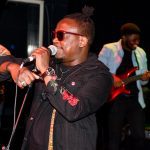Jean was seeking sanctuary due to the bloody civil conflict in the Democratic Republic of the Congo, which has been widely described as the deadliest conflict since World War Two. The conflict led to the deaths of 5.4 million people.
He was placed alone in B&B accommodation in Slough before making his home in Manchester and building a successful career as a musician and an accountant and now a published writer.
From our pioneering Exodus Festival in the mid-2000s to the acclaimed project Lisapo – Tales from The Congo through to his founding the band Britannia Rumba and touring extensively in the UK, to his appearances at CAN/HOME’s Horizons Festival, Jean is a valued member of the ‘CAN family’ and the UK’s diverse creative scene.
Jean’s memoir is a powerful memoir of resilience, identify and spiritual awakening.
“Some books punch you in the gut and then hug you after. The Clock Behind My Mind totally does that. Blanchard takes us from the chaos of Congo to rebuilding a whole new life in the UK, no suitcase, just guts, faith, and a ton of hope.”
“This isn’t some sad “woe is me” story, it’s a comeback story with soul. Blanchard writes with raw honesty and calm strength, showing how pain can turn into power if you let it. His words don’t just tell a story, they teach you how to keep going when life throws curveballs.”
“The best part? It’s deep without being preachy. Blanchard mixes spiritual insight with real-life grit, making you stop and think about your own journey. You’ll find yourself highlighting lines like your life depends on it.”
“By the end, you’ll feel inspired, a little teary, and maybe even ready to face your own mess with more grace. It’s not just a memoir, it’s a quiet revolution in book form.”
Sneha Ahuja, Book and Literary Reviewer
We sat down with Jean to talk about his journey with CAN, his passion for arts as a force for social change and cohesion, and his advice for artists and musicians at the early stages of their creative careers.
How did you first become involved with CAN? How has CAN supported you creatively?
“My connection with CAN began in the early 2000s, during a time when I was searching for belonging and a way to express myself beyond survival. Through CAN, I found not just a platform but a creative family — one that allowed me to merge my story, my culture, and my voice in a way that felt seen and valued. From stage performances with Britannia Rumba to mentoring workshops, CAN gave me the confidence to explore creativity as a form of purpose and healing.”
Why do you think music, writing and art is such a powerful tool to support people who have come to the UK as a refugee or asylum seeker and to tell wider stories about humanity?
“For those who have lost home, music and storytelling become a new kind of home. Art allows us to reassemble our identities on our own terms. It’s not about forgetting where we came from — it’s about weaving the threads of that journey into something beautiful and communicable. Creative expression gives dignity, voice, and space to be human again — especially when systems often reduce us to cases or categories.”
Do you have any advice for aspiring musicians and artists?
“Trust the quiet voice within you. Don’t worry if you feel invisible — often, that’s where the most powerful stories are born. Keep creating. Keep listening. And never underestimate how your voice might one day help someone else find theirs.”
The Clock Behind My Mind is top of our reading list. This moving and inspiring memoir comes highly recommended.



